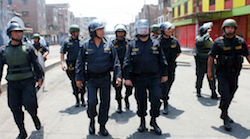In response to heightened criminal activity, a state of emergency has been declared in Callao, Peru’s main port and a major point of departure for cocaine exports. Yet it remains doubtful whether a stronger security presence will address the factors leading to violence.
On December 4, Peruvian President Ollanta Humala announced a state of emergency in the region of Callao in response to high levels of citizen insecurity, reported El Comercio. In order to “confront crime and restore internal order,” the National Police in Callao will receive support, although Peru’s Armed Forces will not be deployed at this time.
According to La Republica, Callao Governor Felix Moreno Caballero petitioned the government to declare the state of emergency given an increase in murders and criminal activity. Over 140 murders related to organized crime have occurred in Callao this year, and residents fear a “war” has begun between gangs battling for control over extortion and drug trafficking.
Since December 5, around 2,000 police officers have been deployed throughout Callao, focusing efforts on its most dangerous areas, reported Diario Uno. Approximately 300 suspects were detained during the first three days of the state of emergency. Callao Vice Governor Walter Mori said the increased frequency of police operations are “dismantling the gangs that are at the heart of the problem.”
The state of emergency is scheduled to last 45 days. During this time, police may suspend constitutional rights by restricting freedom of movement and carry out searches and arrests without a warrant. In Peru, a state of emergency must be renewed after 60 days.
InSight Crime Analysis
Callao (the name of the region as well as its principal city) is home to Peru’s most important seaport. As such, it has become a key hub for drug trafficking and the contraband trade, leading to disputes among criminal groups seeking territorial control.
A corresponding rise in violence in Callao resulting from increased criminal competition appears to be the main motivation behind Humala declaring a state of emergency. And a heavier police presence may indeed help stem violent confrontations between rivals and reduce more local criminal activities, such as extortion.
SEE ALSO: Peru News and Profiles
Nonetheless, the government’s show of force may do little to bring long-term and lasting tranquility to Callao. Facilitating Callao’s status as an organized crime hub is corruption among port officials. The port’s security chief, for instance, is rumored to charge around $20,000 for entry to the port, with port workers paid at least $10 per kilo handled.
Such corruption, and the illicit profits it enables, may be the real “heart of the problem.” As long as the port of Callao remains a viable and permissive way for exporting (or importing) illicit goods, violence arising from criminals competing to control this lucrative real-estate can be expected to continue.

